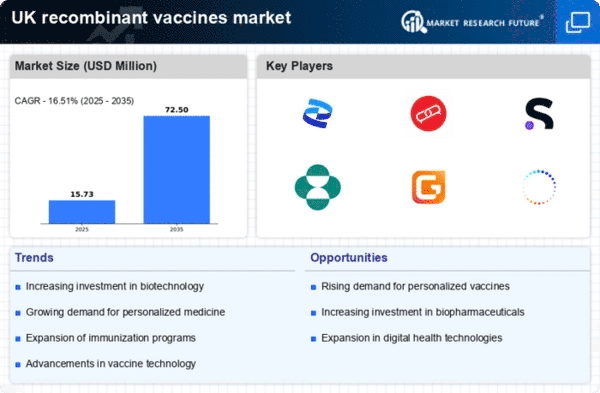Emerging Infectious Disease Threats
The emergence of new infectious diseases poses a significant challenge to public health and is a key driver for the recombinant vaccines market. The UK has experienced outbreaks of various infectious diseases, highlighting the need for rapid vaccine development and deployment. The recombinant vaccines market is well-positioned to address these challenges, as these vaccines can be developed and produced more swiftly than traditional vaccines. The ability to respond quickly to emerging threats is crucial for maintaining public health safety. In light of recent epidemiological trends, the market is expected to expand as health authorities prioritize the development of vaccines targeting newly identified pathogens. This proactive approach may lead to an increase in funding and resources allocated to the recombinant vaccines market.
Rising Demand for Preventive Healthcare
The increasing emphasis on preventive healthcare in the UK is driving the recombinant vaccines market. As healthcare systems shift towards proactive measures, the demand for vaccines that can prevent diseases before they occur is likely to rise. This trend is supported by public health campaigns that advocate for vaccination as a primary strategy to reduce disease incidence. The recombinant vaccines market is expected to benefit from this shift, as these vaccines offer targeted protection against specific pathogens. Moreover, the UK government has allocated substantial funding towards vaccination programs, which may further stimulate market growth. In 2025, the market is projected to reach a valuation of approximately £1.5 billion, reflecting a compound annual growth rate (CAGR) of around 8% over the next five years.
Increased Investment in Vaccine Research
Investment in vaccine research and development is a critical driver for the recombinant vaccines market. The UK government, alongside private sector stakeholders, is committing substantial resources to advance vaccine technologies. This financial backing is essential for fostering innovation and accelerating the development of new recombinant vaccines. In recent years, funding for vaccine research has seen a notable increase, with estimates suggesting that public and private investments could exceed £500 million annually by 2026. This influx of capital is expected to enhance collaboration between academic institutions and industry players, leading to the rapid advancement of recombinant vaccine candidates. As a result, the market is likely to witness a surge in new product launches, catering to a broader range of infectious diseases.
Advancements in Biopharmaceutical Technologies
Technological innovations in biopharmaceuticals are significantly impacting the recombinant vaccines market. The development of novel expression systems and purification techniques has enhanced the efficiency and yield of vaccine production. These advancements not only reduce production costs but also improve the safety and efficacy profiles of vaccines. For instance, the use of mammalian cell lines for recombinant protein production has shown promising results in terms of post-translational modifications, which are crucial for vaccine effectiveness. As these technologies continue to evolve, they are likely to facilitate the introduction of new vaccines into the market, thereby expanding the range of available options for healthcare providers and patients alike. The recombinant vaccines market is poised for growth as these innovations are integrated into production processes.
Growing Awareness of Vaccine Safety and Efficacy
Public awareness regarding the safety and efficacy of vaccines is a pivotal factor influencing the recombinant vaccines market. As more individuals become informed about the benefits of vaccination, the demand for safe and effective vaccines is likely to increase. Educational initiatives and transparent communication from health authorities play a crucial role in building public trust. The recombinant vaccines market stands to gain from this heightened awareness, as these vaccines are often perceived as safer alternatives due to their targeted design and reduced risk of adverse reactions. In the UK, surveys indicate that approximately 75% of the population supports vaccination programs, which may translate into increased uptake of recombinant vaccines in the coming years.
















